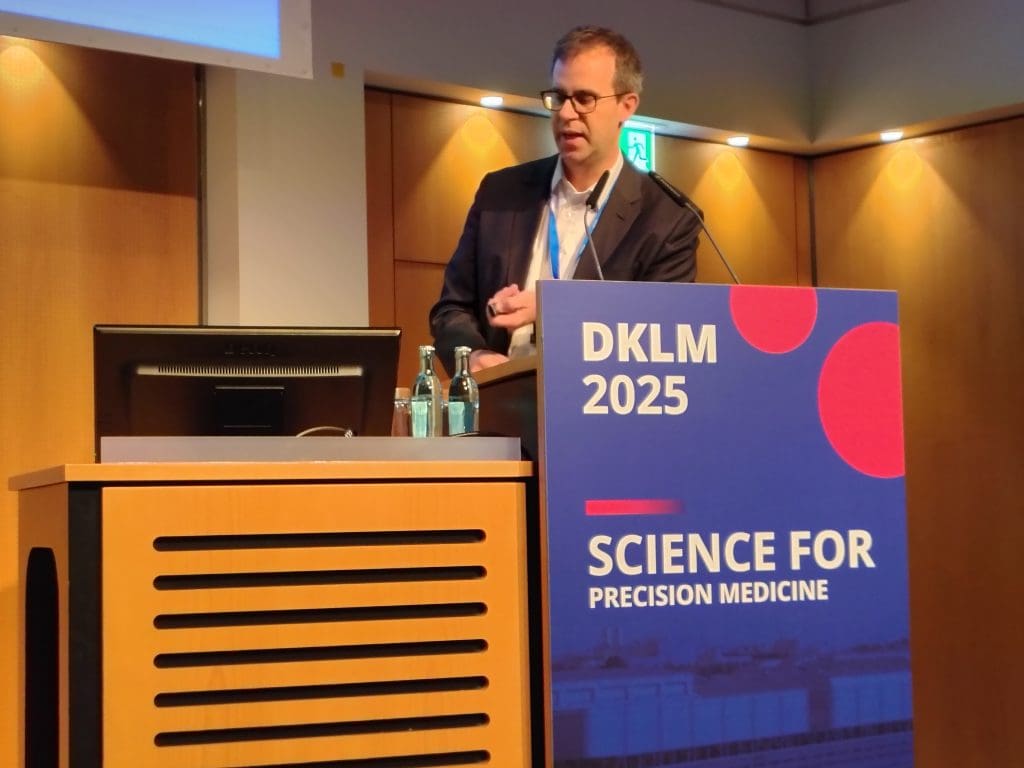DKLM 2025: Overregulation of IVDR threatens development of novel diagnostic methods for serious childhood diseases
Overregulation in the IVDR area threatens the development of novel diagnostic procedures and thus targeted therapies at Germany’s university hospitals. This became clear at the DKLM 2025 in Leipzig during the presentations within the session “New Drugs for Precision Medicine”. The development of high-calibre biomarkers against sometimes life-threatening immunodeficiency diseases in children is particularly affected. However, these biomarkers are necessary not only to develop diagnoses, but ultimately also to develop the resulting therapies. Prof. Kaan Boztug pointed this out in his lecture.
DGKL-PrûÊsident wies wûÊhrend der ErûÑffnungsrede ebenfalls auf die IVDR-Problematik hin und betonte die Notwendigkeit, der Labormedizin die ForschungsmûÑglichkeiten nicht zu kappen.
The points of criticism are mainly substantiated by the AWMF. In an expert report at the beginning of October 2025, the Association of Scientific Medical Societies (AWMF) effectively called for an urgent amendment to EU Regulation 2017/746 on In Vitro Diagnostic Medical Devices (IVDR). As part of the early target evaluation in accordance with Article 111 IVDR and Regulation (EU) 2024/1860, the AWMF advocates a reduction in bureaucratic hurdles for devices that are manufactured and used exclusively in medical laboratories.

The report, written by DGKL member Michael Vogeser (LMU Klinikum Mû¥nchen) and colleagues from leading German university hospitals, was published in the journal Clinical Chemistry and Laboratory Medicine (DOI: 10.1515/cclm-2025-0941). The AWMF, which represents over 200,000 physicians in 184 professional societies, sees Article 5(5) IVDR as a disproportionate overregulation of in-house IVDs (IH-IVDs): These tangible products are not offered on the EU market and are therefore not subject to the regulatory core of the IVDR (Art. 1(1)). Instead, they should be regulated nationally, for example through the German Medical Device Operator Ordinance and the guideline of the German Medical Association for quality assurance of laboratory medical examinations.
Despite criticism, the report praises the stricter regulation of commercial IVDs for patient safety: Higher requirements for notified bodies, clinical assessment, EU reference laboratories and post-market surveillance are advances compared to the old IVDD. According to the paper, the EUDAMED database promises transparency, but is late. Transitional periods until 2029 are currently preventing supply bottlenecks; a final evaluation of effectiveness is only possible afterwards.
The authors call for a broad discussion and invite comments in the journal.
Original Paper:
Read Also:
DKLM 2025: Exclusive interview with Prof. Uta Ceglarek and Prof. Berend Isermann – MedLabPortal
Editor: X-Press Journalistenbû¥ro GbR
Gender Notice. The personal designations used in this text always refer equally to female, male and diverse persons. Double/triple naming and gendered designations are used for better readability. ected.




